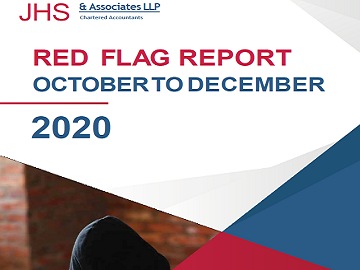Huzeifa Unwala, Senior Partner, JHS & Associates LLP
SEBI Advisory on disclosure of Impact of CoVID 19
SEBI has issued an advisory to listed entities on May 20th, 2020 to disclose the impact of material events of CoVD 19 pandemic. As per SEBI advisory, while the lockdown and disruption are unanticipated and beyond the control of the entities, such events can lead to contortions in the market due to the gaps in the information available about the operations of a listed entity. Hence, a listed entity needs to ensure that all available information about the effect of these events on the company and its operations is communicated in a timely and efficacious manner to its investors and stakeholders.
Clause 6 of Para B of Part A of Schedule III of LODR specifies events such as “Disruption of operations of any one or more units or division of the listed entity due to natural calamity (earthquake, flood, fire etc.), force majeure or events such as strikes, lockouts etc.” that shall be disclosed upon application of the guidelines for materiality referred in Regulation 30(4). Further, other clauses in LODR require listed entities to disclose information having a bearing on the operation/ performance of the listed entity.
SEBI has observed that many listed entities have made disclosures under LODR Regulations, primarily intimating shutdown of operations owing to the pandemic and resultant lockdowns. Some listed entities have provided information relating to actions taken towards sanitation, safety, etc.; the number of entities that have disclosed the financial impact, however, is small.
SEBI advisory states that listed entities should endeavour to ensure that all investors have access to timely, adequate, and updated information. Towards this end, entities are encouraged to evaluate the impact of the CoVID-19 pandemic on their business, performance, and financials, both qualitatively and quantitatively, to the extent possible and disseminate the same.
Estimating the impact of business uncertainty on Business Plans/ Budgets
The nature and extent of uncertainty caused by CoVID 19 are so high that CEO’s and CFOs are rescuing from making earnings forecasts. The impact on the Control environment and financial statements are not determinable amid the CoVID 19 crisis, at best we may draw a broad sketch and potential scenarios on the likely areas of impact on account of lockdown and business disruption. CEOs and CFOs should cast their cash flows, P&L, balance sheet in each scenario, and identify events and outages that might impair liquidity. Boards and Audit Committees may have to spend substantial time in Q1 of this fiscal in working along with the CEOs and CFOs to get to the correct estimate of the quantum of the impact of CoVID 19 on the business.
Scenario play is an effective tool for managing uncertainty. Board’s may look at designing scenarios with the senior management to test the economic viability and resilience of the entity amid the lockdown and post-work resumption. Scenarios to include post ease of lockdown and work resumption – recurrence of virus and impact on economic activities.
Liquidity crisis: –
Business plans, annual budgets and financial forecasts are undergoing quick changes; auditors are assessing the going concern status of audit entity on the basis of new CoVID 19 guidance issued by accounting bodies. Boards and management teams should assess the liquidity mismatch and economic viability of the entity to reach conclusions on the sustainability of operations.
Listed entities should evaluate their financial positions, the quantum of liquidity gap; ability to service debt and other financing arrangements.
Employee Safety: –
People are the cornerstone of any control activity. Since people are most impacted by COVID 19, the impact on the Control environment would permeate virtually all policy and procedural prescriptions that relate to people. Beginning with the code of conduct, people safety, emoluments, leave entitlements, new labour laws, work procedures, employee get-togethers, etc. The code of conduct would need a specific amendment to accommodate mandatory thermal screening of employees, visitors, etc. and voluntary on-going health check assessments of employees.
A new set of work ethics and an improved employee’s work-life balance equation is beginning to emerge.
Entities should disclose steps taken to ensure smooth functioning of operations, including the sustainability of operations in case of future lockdowns.
Demand for products/ services: –
It is difficult to predict the behaviour of customers in times of crisis; however, by deploying customer outreach programs, business teams should estimate a likely drop in customer orders, changed credit terms, etc. Typical controls in order to Cash cycle shall undergo a change for example KYC template of in-person may be replaced with Video KYC, pricing models may shift from premium to cost-plus to bag higher volumes, a greater focus on retaining customers, faster deliveries, etc. The impact would be felt across the customer life cycle and touchpoints.
Increase in digital customer interactions will require substantial modification to the fair practice code of organisations and real-time grievance redressal mechanisms.
Entities should disclose the impact of fall in demand for their products/ services to investors/ stakeholders.
Supply Chain: –
Organisations are experiencing supply-side shocks from vendors on account of the failure of logistics vendors, etc. Entities should evaluate existing contracts/agreements where non-fulfilment of the obligations by any party will have a significant impact on the listed entity’s business.
Entities should disclose steps taken to ensure the smooth functioning of operations.
Transition & Change Management initiatives: –
To deal with the CoVID, 19 crisis organisations have created dedicated task forces to roll rapid digital, process transformation and implement employee protection measures. This task force may take quick decisions and cut across lines of authority, thereby diluting the traditional lines of defence. Boards and senior management teams would need to assess the adequacy of control design and operating effectiveness of the initiatives led by the central task force. Changes and modifications, especially to the IT infrastructure to enable secured work from home processes, would need careful evaluation for compliance with cybersecurity policies.
Continuous qualitative and quantitative disclosures: –
SEBI advisory states that listed entities around the world have been making disclosures regarding the impact of the pandemic, including that on financial condition and results of operations, future operations, capital and financial resources, liquidity, assets, internal financial control over financial reporting and disclosure controls and procedures, demand for products/services etc. Regulators have encouraged timely reporting as well as complete and accurate disclosure of the impact, as far as possible.
The author has designed a CoVID 19 Business Impact Matrix (Exhibit I) that can serve as a guiding matrix for listed entities to evaluate the impact of CoVID 19 pandemic on their business.
As per SEBI guidance to have continuous information about the impact of CoVID-19 on operations, listed entities may provide regular updates, as and when there are material developments. Further, while submitting financial statements under Regulation 33 of the LODR, listed entities may specify/include the impact of the CoVID-19 pandemic on their financial statements, to the extent possible. SEBI advisory requires that those listed entities disclose material information related to the effect of CoVID-19; they should not resort to selective disclosures, keeping in mind the principles governing disclosures and obligations of a listed entity.
CoVID 19 – Business Impact Matrix (Illustrative)
| Customer | People | Financials | Supply chain | Internal Financial Controls |
| – Drop-in demand for products/ services – Number of customers lost – Delay in the launch of new products/ services – Loss of qualified leads – Sales at higher discounted prices/ revenue foregone – Delay in cash realisation | – Loss of lives – Loss of productive hours/ idle time – Loss of talent/ number of people migrated – Incident responses – Time spent by the cross-functional COVID 19 response team/ task force | – Liquidity mismatch/ gap – Delayed deliveries – Quality rejects – Obsolete inventory – Idle assets/ impairment of assets – Bad debts/ credit losses – Diminution in investments – Increase in financing costs legal proceedings – Delays/ penalties in meeting compliance obligations – Financial Statements/ Accounting policies – Contingent liabilities | – Delayed supplies – Supplies at higher rates – Supply defaults leading to customer attrition – Loss of vendors – Advance supplier payments – Altered supply routes leading to cost escalations – Unclaimed supplies at ports/ demurrage | – Code of conduct – Employee Safety policies – Operations SOPs and flow charts – Work from home – information security – New risks and controls to be added to Financial reporting, HR, IT, Operations, etc. – Transition & Change management initiatives |










